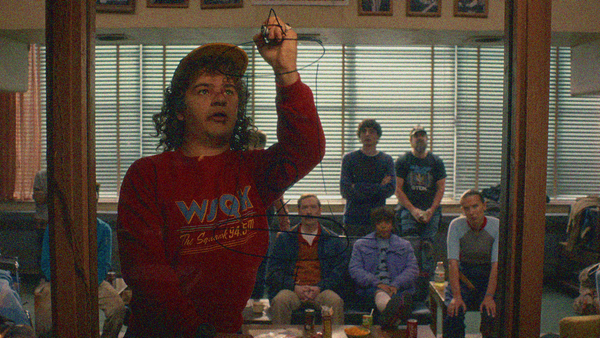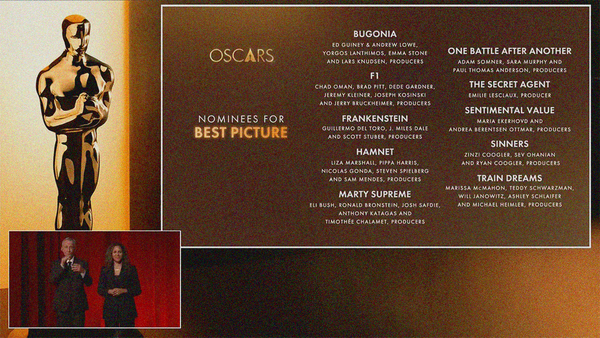Week Ending 6/6/25
Going to the library

I used to have a library card. It’s probably tucked away in a drawer somewhere. The last time I used it? Maybe 2002? I used to hit the Audubon after work because they had the largest selection of CDs in the county. I had recently received a burner that let you do one track at a time and would make personal “greatest hits” compilations of my favorite artists.
Eventually Spotify made hard copies of music obsolete. Twitter quickly rotted my attention span from being able to read an actual book anymore. And many local libraries eventually ended up closing. So, libraries ceased to exist in my consciousness (besides as a venue for Jordan and me to screen films for Cultivate Cinema Circle).
Well, I just got a new card in the mail this week (ten years too late considering I live across the street from one). Since I still use Spotify and still can’t read two pages of a novel without falling asleep or, worse, realizing I retained none of the words, the current purpose for signing up is easy: movies.
Not to watch, though. I have too many streaming subscriptions for that. No, it’s the silliest of reasons: continuing my cinematicfbombs.com research. As I’ve been scouring the IMDb database’s PG and PG-13 rated entries, I’ve discovered an insane number of titles I’ve never even heard about. Unsurprisingly, they also aren’t available to stream or buy digitally. So, before I start searching eBay for old DVDs to purchase, I thought I’d investigate the Buffalo & Erie County Library system first.
Sure, only five of my first thirty-six queries actually came up as being available, but that’s five fewer titles I need to worry about acquiring. Now I wait to see how long before those holds make their way to my branch.
What I Watched:
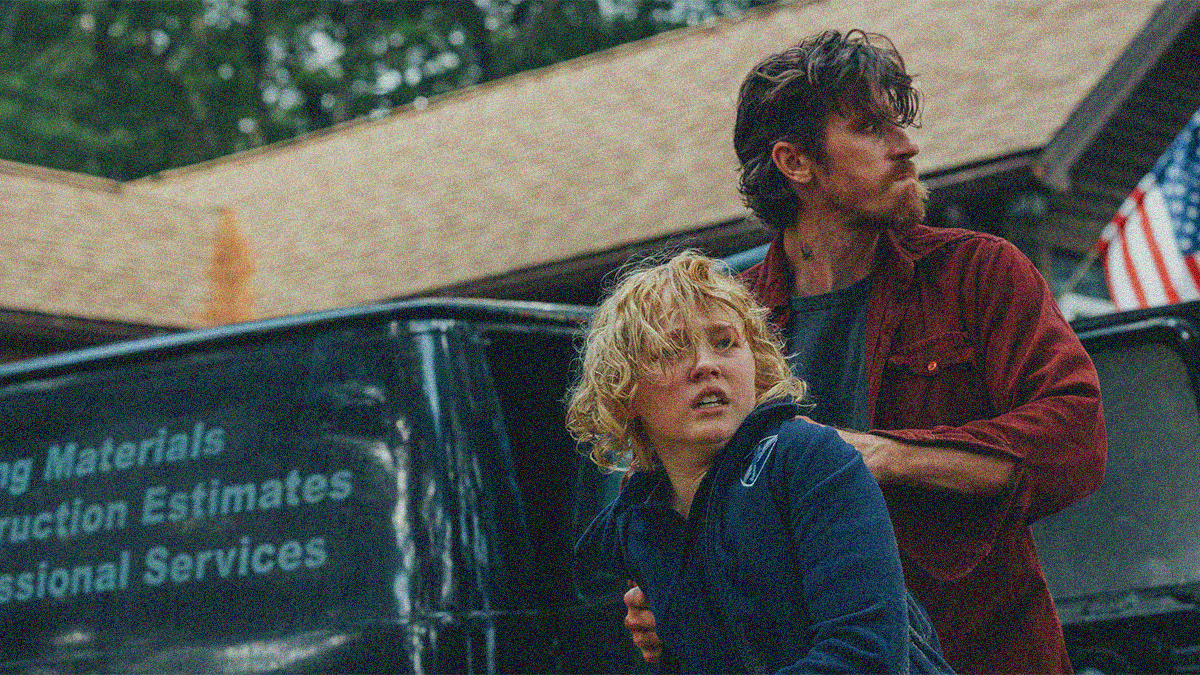
BARRON’S COVE
(limited theaters & VOD)
The easy comparison point—if also a lofty one—for Evan Ari Kelman's directorial debut Barron's Cove is Mystic River. You can see it in Garrett Hedlund's performance as Caleb upon learning about the brutal death of his young son Barron. He's screaming so loudly at the scene of the crime that multiple cops prove necessary to hold him back, just like Sean Penn in Clint Eastwood's modern classic. And we assume things might play out similarly too since Caleb is a bruiser working for his criminal uncle Benji (Stephen Lang), a man with the connections and reach to find out what happened so he can unleash righteous vengeance.
Where Kelman takes things in a different direction, however, is that Caleb isn't entirely a "bad man." Yes, he does bad things. Yes, he's defined by the trauma and abuse that has cultivated a violent anger in his soul. Yes, he's let his ex-wife (Brittany Snow's Jackie) down and wasn't there to save their boy. But he was a good father. He loved his son and would do anything for him—even suffer through the dark cloud of his life to protect Barron from the painful childhood he endured. That boy was everything to Caleb and you can believe it when he says he has nothing left to lose. He'll bring Hell to earth to discover the truth and do what's necessary to make it right. And, unlike Penn's Jimmy, Caleb can still come out the hero.
That shouldn't excuse his actions, though. Credit Kelman for staying true to the flawed characters he's brought to life because "good" people who do bad things don't get to just escape the damage left in their wake. Caleb is therefore more antihero than hero. He's the film's protagonist, but he's still driven by reactionary impulses that more often than not lead towards inexcusable deeds. So, the real dramatic arc isn't about the inevitable reveal of what happened (we already mostly know courtesy of the opening scene), but whether Caleb will do what he sets out to do or realize the truth is more complicated than his rage demands. Because if anybody knows what it's like to lose one's innocence without fully grasping what's been lost, it's him.
In many regards, despite centering around a child's death, Barron's Cove is about survival. Caleb's survival through brutality and his desire to wall the resulting darkness away from his son. Prospective State Senator Lyle Chambers' (Hamish Linklater) survival beneath generations of tradition leading him to be unable to hold that darkness at bay from spilling onto those around him. Young Ethan's (Christian Convery) survival pushing him to unwittingly project his pain onto others without fully grasping the consequences until it's too late. Each of these men tell lies to each other ... and themselves, rewriting history to service a narrative that means nothing upon realizing they can no longer protect what they're fighting for: Caleb's son, Lyle's career, and Ethan's humanity.
So, they scramble. Caleb kidnaps Ethan to find out how his son died. Ethan tells him what he wants to hear to hold his malice at bay. And Lyle works behind the scenes to figure out how to save his poll numbers, using everything at his disposal to manufacture a truth that's willing to embrace dark, unconscionable contingencies that might still curry favor through sympathy. Kelman orchestrates multiple hunts as result. The police and Lyle hunting Caleb. Caleb hunting Ethan and Lyle. The audience hunting threads of truth beneath lies that might hold more truth than you'd expect. Add Raúl Castillo's Detective Navarro, an outsider untouched by the town's corruption, as the sole objective observer willing to unravel the obviously manipulated threads, and the suspense is never lacking.
It says something too that Tramell Tillman's small role as a throwaway plot device delivers necessary pathos to help us understand Caleb as more than what the police paint him. The same with Lang in a similarly small role meant to add grit and danger while also providing a mirror to remind us of what Caleb should have become but didn't. Both are a testament to the performers, but also to a script that finds the capacity to provide its pawns a level of depth needed to feel lived-in and meaningful to the whole. Those two characters are especially crucial considering their contrast with each other: two military archetypes split by a chasm of compassion. Benji thinks his power made Caleb loyal, but it was really the unintended kindness from reaching out his hand to do so that made it stick.
The other relationships throughout the film build off that fact. The big one is Ethan's fear of Lyle mimicking the rage Caleb had for this father that drove him to Benji, but there's also Caleb's fear of being helpless to stop his anger if Barron ever became its target. It's why Hedlund and Convery's dynamic is so compelling. Yes, there's the manipulated sense of mutually assured salvation, but also proof of why Ethan resented Barron so much. And while Kelman could have simply let us know it, he goes above and beyond to ensure Caleb does it too via a final shot that may sound schmaltzy on paper, but is executed to perfection on-screen.
Those sentiments are true for the entirety of Barron's Cove. It may often look like just another generic thriller with dark subject matter, but it always surprises by putting character and emotion above a desire to deliver hollow clichés for mainstream appeal. It's their ability to overcome their violent natures and do the right thing that makes these men interesting, so they must remain violent for it to work. That means Kelman can't water down the resulting impact by redeeming them to the world. His cowards remain cowards, and his criminals accept that the blood they spilled will inevitably catch up to them in the end. Some, however, might still find redemption for themselves to be at peace when it does.
- 8/10
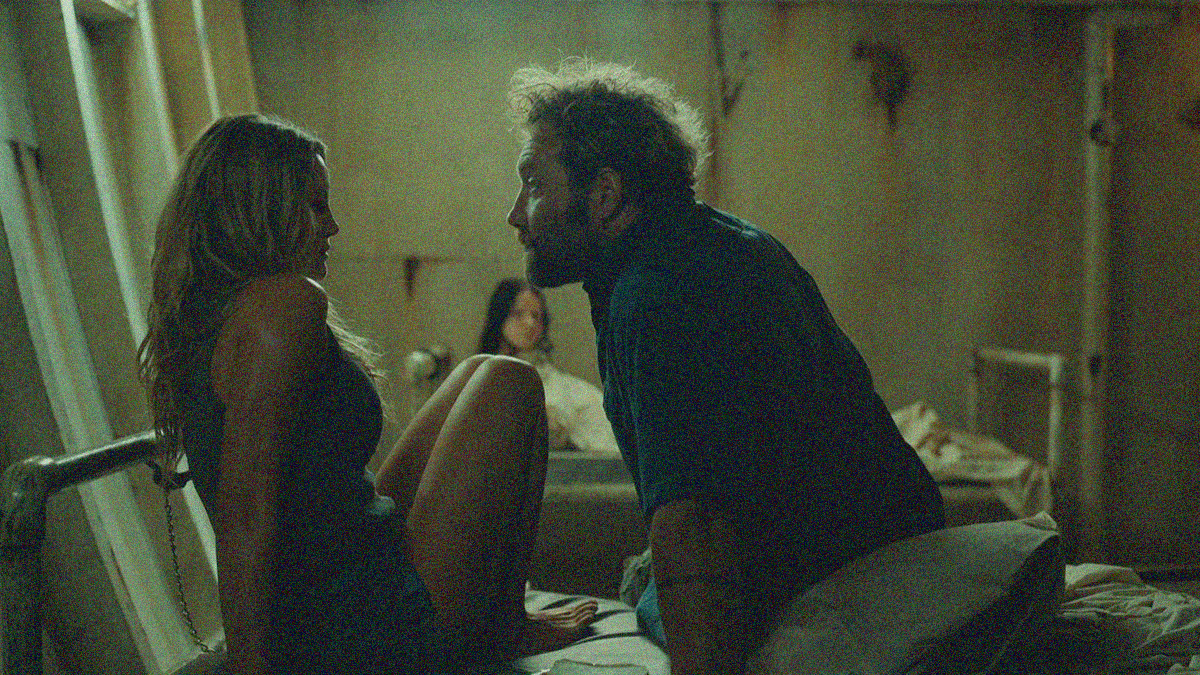
DANGEROUS ANIMALS
(in theaters)
Bruce Tucker (Jai Courtney) is a miracle. The boy who survived a shark attack with all his limbs intact. So, it's not far-fetched that he'd grow into a devotee of the cartilaginous fish that spared his life. Or that he would view these creatures as Gods as a result. Tucker worships them so much that he's dedicated his life to changing the narrative via a cage experience tourists can use to witness their splendor. He'll toss facts about mosquitoes being more deadly to humans and monologue about our gut instinct allowing fear to wrongly position the shark as our predator. The "Tucker Experience" is akin to exposure therapy. He's a disciple converting his new flock.
Except, as Dangerous Animals screenwriter Nick Lepard and director Sean Byrne soon reveal, Tucker isn't some eccentric marine preacher. No, he's a serial killer who fancies himself a land shark due to the beasts letting him go that day. He does give paying customers a good show and proselytizes his "faith," but it's all a front to acquire new victims. They aren't just for him, though—despite his delight in the process and collection of VHS trophies to rewatch over dinner. They are also for his God. Sacrifices upon an altar of water. Gifts for a species that lets the world go round through its job as sea policemen ensuring the weak won't run amok. Tucker is a man with a higher purpose than mere murder. He's a prophet.
It's a fascinating bit of backstory for a character Courtney sinks his own teeth into en route to captivating audiences with a comically smarmy good time. His corny nature when selling customers on the ride (and calming them down with humorous distractions) helps us buy his otherwise steely-eyed determination to hunt prey as though recruiting talent for this very horror film we've chosen to watch. There's no fourth wall breaking, but Tucker definitely fancies himself an artist capturing a Barnum & Bailey type show regardless of its ability to only entertain himself. He revels in the chase. Goads his Gods into making the kill as bloody as possible. And encourages the fight some of the women he kidnaps put up to increase his own excitement.
Zephyr (Hassie Harrison) is one such fighter—a woman Tucker sees himself in despite never pivoting to turn her into an acolyte. A solitary soul in Australia to escape her past and catch some waves, she's the perfect mark because no one would miss her enough to come looking if she disappeared. Tucker surely sees that as a sign. That she was brought by providence to serve her purpose within his warped circle of life. And everything would have gone as usual if not for Lepard and Byrne needing an external force to help even the narrative scales. You see, timing is everything. If Tucker snatched Zephyr up a day earlier, she never would have met Moses (Josh Heuston) and ensnared his heart. She may be a loner, but she's no longer alone.
Add another potential victim (Ella Newton's Heather) to prolong the inevitable moment when Zephyr finally gets her chance at the end of Tucker's hook and Dangerous Animals proves ready to deliver all the pieces that make up a solid horror thriller. Graphic deaths. Unforgettable villain. Headstrong hero. And the power of love to wake said hero up to the reality that having something (or someone) to fight for makes you push further than you ever could for yourself. What helps the film stand apart, though, is that the same sentiments are true for the villain. If Tucker were simply killing for pleasure, he might be more careful. But he's doing this for the sharks. It's ritualistic. Knowing they "need" him to follow through drives him to risk his own safety for their satisfaction.
So, while the film doesn't deliver much that other captivity horror hasn't already supplied, the characters possess the goods to make us forget each new plot progression is a familiar check stop upon a well-worn trope. The prologue will have a body count. The hero will try and escape the emotional connection she needs to survive. The killer will get too comfortable hearing himself talk and ultimately provide the cracks in the façade that provide her a slim chance of escape. And the surefire mode of death will have a single (albeit unlikely without some luck) flaw exposed to keep the game moving longer than the premise probably deserves. But Courtney and Harrison are too much fun to care.
At one point I even thought the filmmakers found the guts to subvert expectations and let more blood flow by slamming shut the doors so many of its ilk open for the precise purpose of saving the day, but Lepard and Byrne simply enjoy toying with us as much as the characters. It does eventually render the tension moot (our own bloodlust stops caring about who lives because we just want to see someone die) while also leaving a ton of loose salvation threads never to be pulled, but the entertainment value remains. It leans too hard into its rote Hollywood finale as a result of leaving those darker and more interesting possibilities solely in my head, but that's today's industry. We can have our derangement, but not enough to ruin any love conquers all mandates.
- 6/10
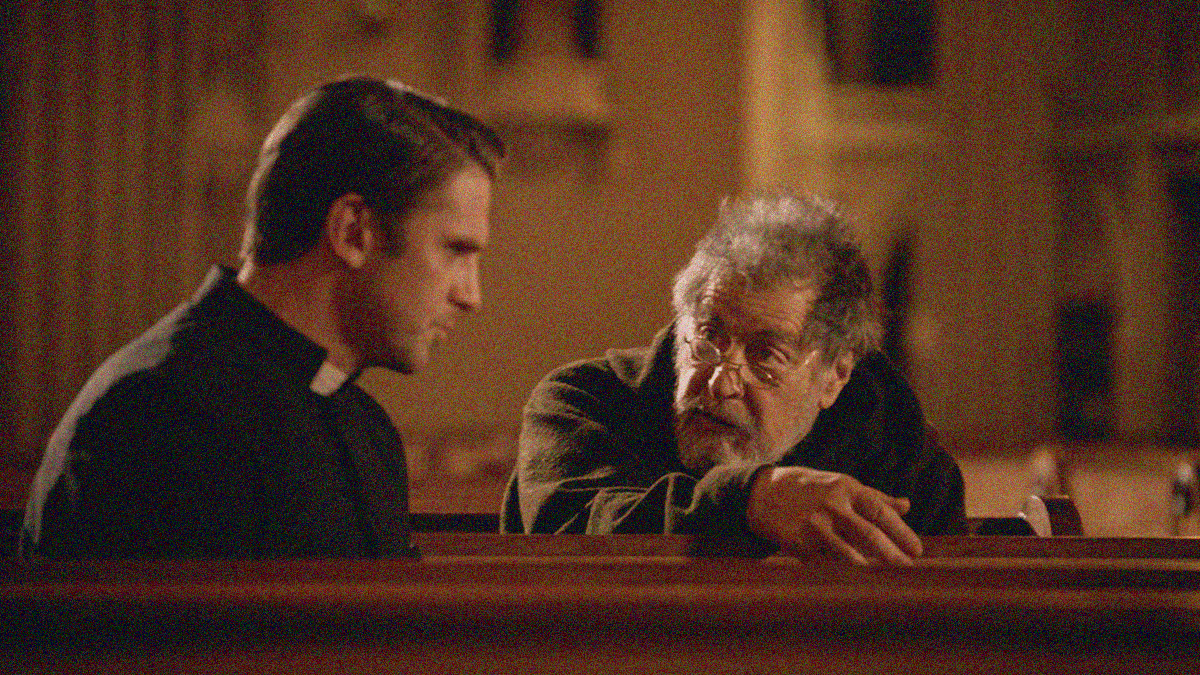
THE RITUAL
(in theaters)
If David Midell's cinematic rendition of the famed American exorcism of forty-six-year-old "Anna Ecklund" in 1928 teaches us anything, it's that exorcisms are inherently uninteresting. Boring even. Because each day is the same. Passages from the Bible are read aloud, the possessed victim writhes in pain while a demonic presence speaks in foreign languages, and the participants are forced to question their faith. When things go too far, someone shuts it down either because the session has completed or they are too afraid to continue. It's not therefore about the "patient" at all, but the priests and nuns desperately searching for answers at a time when their understanding of God is its weakest.
That is what The Ritual delivers. Multiple days. Multiple setbacks. Multiple injuries. And the moment that will cement Father Joseph Steiger's (Dan Stevens) faith by finally heeding the call to act rather than question. It makes sense since we're told Midell used his notes (published as a pamphlet entitled "Begone Satan!" in Nazi Germany, before being translated in English, that allowed this event to be considered the most documented exorcism in American history) to piece together the month of sessions performed on-screen. I say "told" because Steiger isn't given credit beyond mention via interstitial. No, Midell and Enrico Natale earn the story credit instead, causing us to wonder how much we're watching is actually true beyond the names.
There's also a prevailing notion that Father Steiger had a choice about allowing the exorcism to be performed in his church. The Abbess (Patricia Heaton) blames him for letting evil into their sanctuary and questions his leadership despite a scene showing he tried to decline. Bishop Edwards (Patrick Fabian) all but demands Steiger play host because the powers that be already decided for him (although factual accounts say Steiger did suggested the location, so maybe the confusion is a result of playing fast and loose with details). He would take notes while two sisters assisted in German-American Capuchin friar and Roman Catholic priest Father Theophilus Riesinger's (Al Pacino) ceremony. They would rid young Emma Schmidt (Abigail Cowen, not forty-six-years-old)—the real name of "Anna Ecklund"—of whatever inhabited her.
I believe the ritual is supposed to be boring in its routine repetition because we're supposed to worry less about Emma's wellbeing than that of Father Steiger. He is the one being tested as a result of Riesinger's theatrics. Will he allow the nuns in his care (including Ashley Greene) to keep getting hurt? Will he allow the Reverend Mother to collect enough evidence to send him packing to a different congregation? Will he be able to grieve the sudden death of his brother with the care necessary for healing while also dealing with a supposed demon throwing it in his face? Will he find the strength and conviction to stay on his path as a man of God when this uncertain chaos tempts him to give up?
Unfortunately, Father Steiger isn't presented as someone worthy of our intrigue. Not when everyone else is much more compelling despite having far less to do. Riesinger and Emma are the draw and yet they become window dressing for Steiger's epiphany. Even Greene's Sister Rose supplies more dramatic weight as she too wrestles with her faith before being relegated to the fringes as another point of seduction for the demon and Steiger to latch onto despite her doing nothing to warrant it. Steiger is just a guy in mourning who's susceptible to the darkness of the situation as well as the coincidental signs of God that might ultimately renew his dedication to the cloth. He gets to choose.
As such, we receive all the usual clichés of better exorcism titles populating a psychological study of a priest that wants to be a horror film so bad it relies on loud music cues to jolt us awake during jump scares the filmmakers obviously didn't think were effective on their own. The Ritual does look good with some truly gruesome moments of bloody, fleshy vomit and wire work once Emma is off-leash (Cowen is giving her all in a physically demanding role), so it's easy to be frustrated that Midell didn't just pivot to B-movie carnage. His straddling of the line between all-out genre gore and introspective crisis of purpose leaves the whole feeling at war with itself because the drama never compels us to forget we're still watching in the hope for more chaos.
Pacino's accent isn't as distracting as some have said (it just sounded like he was channeling his Shylock from Merchant of Venice). I had more trouble figuring out if Heaton was doing one herself or merely supplying some wild line readings. The real oddity for me was the faux shaky-cam aesthetic that seemed to amplify during those jump scares to comedic effect despite there not being one intentionally humorous bone in the entirety of the work. I dismissed the first instance as the price of doing business, but subsequent ones had me chuckling as I recalled the camerawork in The 'Burbs when Tom Hanks and Rick Ducommun realize they're holding a human femur. I knew things had become too self-serious when all I wanted to do was pretend the film's goal was for me to laugh.
- 5/10

SUNLIGHT
(limited theaters)
Roy's (Shenoah Allen) plan was suicide. He went to the Sunlight Motel (coincidentally, the same name as the radio station he works for, Sunlight Radio) with rope, strung it around the ceiling fan, and put it around his neck. So, the fact that catching a glimpse of a person wearing a human-sized monkey costume looking in through his window was the reason he ultimately kicked out the chair from beneath him shouldn't transfer any blame or guilt. Sure, he might have had second thoughts, but him being far enough into the plan that an unexpected surprise could make it reality is no one's fault but his own. That said, Jane (Nina Conti) couldn't live with herself if she didn't save his life.
This is our unforgettable entry into the aptly titled Sunlight, direct by Conti and co-written by Allen. That quick shot of "Monkey" (Jane's defense mechanism and alter ego—reimagined from Conti's ventriloquist act) followed by Roy's descent before the cut to black reopens within the latter's Airstream as it drives down a desert road. We are therefore waking up right alongside Roy in the passenger seat, completely disoriented as to how he got there and where he's going. Seeing "Monkey" behind the wheel only makes things more unsettling with her explanation about "borrowing" the vehicle to drive herself to Colorado providing zero help. Because A) she's a monkey and B) he's supposed to be dead. These aren't normal circumstances.
That said, "normal" is precisely what both these characters hope to avoid. It's why Roy tired of existence and Jane hides beneath the skin of an alternate persona. "Normal" has never been enough. "Normal" has only ever felt abnormal. Some of the reason is trauma. Some of it is insecurity. Roy has begun to consider his job meaningless—hack work getting paid to be an obsequious host to interviewees with nothing important to say. Jane has begun to acknowledge that her self-destructive patterns have placed her on a road towards isolation—a slave to her worst impulses for no other reason than to feel something regardless of whether it makes her life worse in the process.
Joining forces is thus as much about guilt-laden coincidence as kismet since they are both unhinged enough to deal with the other sans judgement. She needs to go to a lake in Colorado to at least fulfill the beginning of her dream to own a pontoon boat business regardless of having no money or plans to do so once she arrives. He needs to reconcile the fact that he's still alive with the reality that he's spent the past few months assuming the opposite—meaning he must call his boss (Rachel Kylian) and mother (Melissa Chambers) to course correct. And it's through this imperative that he discovers an answer for both of their woes: a twenty-thousand-dollar watch buried six feet deep with his father's body.
This road trip's destination becomes secondary to the journey as a result. Yes, that money can make Jane's dream real while its procurement can help Roy exorcize whatever demons his father's memory still conjures, but these are Band-Aid fixes born from the same faulty impulses as her poor choices in sexual partners and his decision to kill himself. Once the initial joy of the distraction is over, both would inevitably fall back into their usual pattern of self-loathing. So, the idea is that the other's company might change or reveal something that refocuses their motivations to provide an off-ramp from their constant ability to get in their own way. Maybe their respective troubles can allow them to be the other's inspiration towards healing.
It's that potential that makes Sunlight a profoundly compassionate and heartfelt drama despite its overtly insane premise and specific brand of darkly sardonic hilarity. Credit Conti and Allen for never allowing their script to forget that purpose too since the comedy could have succeeded on its own. They could have pivoted this complex, tender love story into a Hollywood rom-com by centering generic tropes that don't care about the reasons Roy and Jane are here. Instead, they stay true to the characters' fallibilities. They allow the duo's worst impulses to continue sabotaging their best laid plans so that the other can step back with understanding and honestly express that it'll be okay. That the goal isn't to exploit the other like everyone else in their lives. They get it.
They know what it's like to feel less than. To be smothered, ridiculed, and controlled (pair Bill Wise's Wade with Chambers' Gail to serve as two very different sides of the same "we know what's best for you" coin of "love"). If Jane needs to be "Monkey" to survive, Roy won't seek to shatter the façade and let her down too. If Roy needs to dig up his father's grave for catharsis, Jane won't tell him he's being dumb. And neither act must be "healthy" to be necessary. They simply need the room to see their respective adventures through so they can know what it looks like on the other side. Having someone to look out for them while doing it frees them from their own self-doubt. For the first time, someone accepts them on their terms. Loves them on their terms.
The humor would still work without this authentic strain of empathetic humanity holding it together, but the fact our laughter isn't in service of hollow cliché ensures it won't also prove disposable. Conti excels at portraying the consequences her characters face by never undercutting the danger inherent to the absurdity (this journey cannot work without jail time) and always finding the joke in the drama (a scene flirting with romantic undertones is expertly subverted by the monkey suit's mechanics). So, no matter how wild things get, Sunlight doesn't relinquish its grasp on its core emotional reality. And all the while Conti and Allen refuse to turn Jane and Roy's pain into the punch line. Every joke is instead born from the humanity their torment has yet to fully defeat.
- 9/10
Cinematic F-Bombs:
This week saw The Butler (2013), Eagle Eye (2008), Green Book (2018), The Heavenly Kid (1985), A Home of Our Own (1993), K-PAX (2001), Meteor (1979), Necessary Roughness (1991), Pretty in Pink (1986), and Wild Rovers (1971) added to the archive (cinematicfbombs.com).
Robert Loggia dropping a locker room speech f-bomb in Necessary Roughness.
New Releases This Week:
(Review links where applicable)
Opening Buffalo-area theaters 6/6/25 -
Aabhyanthara Kuttavaali at Regal Elmwood
Ballerina at Dipson Flix, Capitol; AMC Maple Ridge, Market Arcade; Regal Elmwood, Transit, Galleria, Quaker
DAN DA DAN: Evil Eye at Regal Elmwood, Transit, Galleria, Quaker
Dangerous Animals at at Dipson Capitol; AMC Maple Ridge, Market Arcade; Regal Elmwood, Transit, Galleria, Quaker
Thoughts are above.
I Don't Understand You at Regal Galleria, Quaker
Housefull 5 A at Regal Elmwood, Transit, Galleria
Pavements at Regal Transit
The Phoenician Scheme at North Park Theatre; Dipson Amherst; Regal Elmwood, Transit, Galleria, Quaker
The Ritual at Dipson Capitol; Regal Quaker
Thoughts are above.
Thug Life at Regal Elmwood, Transit
Streaming from 6/6/25 -
- The Alto Knights – Max on 6/6
- The Ballad of Wallis Island – Peacock on 6/6
- K.O. – Netflix on 6/6
- Magic Farm – MUBI on 6/6
- Neighborhood Watch – AMC+ on 6/6
- Parthenope – Max on 6/6
- Predator: Killer of Killers – Hulu on 6/6
- Straw – Netflix on 6/6
- Becoming Led Zeppelin – Netflix on 6/7
- Trainwreck: The Astroworld Tragedy – Netflix on 6/10
- Misericordia – Criterion Channel on 6/10
- Our Times – Netflix on 6/11
- Snow White – Disney+ on 6/11
- Titan: The OceanGate Disaster – Netflix on 6/11
- Deep Cover – Prime on 6/12
Now on VOD/Digital HD -
Holy Cow (6/3)
Minted (6/3)
Sinners (6/3)
Smoking Tigers (6/3)
We Were Dangerous (6/3)
“We revel in [the leads'] spirit and autonomy; their awareness of just how messed up the situation is. By never shying away from those horrors, watching this trio consistently rebel only amplifies the potency of their inspirational battle cry.” – Full thoughts at The Film Stage.
Barron’s Cove (6/6)
Thoughts are above.
Emmanuelle (6/6)
Hurry Up Tomorrow (6/6)
Julie Keeps Quiet (6/6)
Magic Farm (6/6)
Marshmallow (6/6)
Resurrection Road (6/6)
The Surfer (6/6)
“The Surfer is about torturing Nic Cage until all pretense evaporates to leave his purely primal instincts in charge. Sell [his] soul for the dreams society indoctrinated him to achieve or realize no "reward" is worth relinquishing his humanity.” – Full thoughts at HHYS.
Vulcanizadora (6/6)
Thanks for reading Hey, have you seen ...?! Subscribe for free to receive new posts and support my work.

